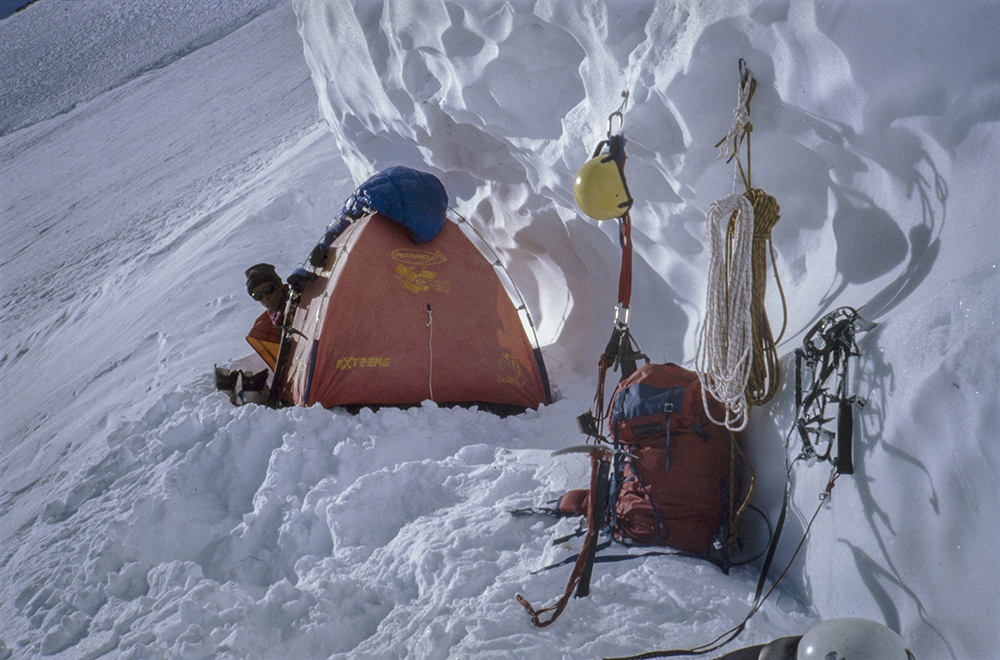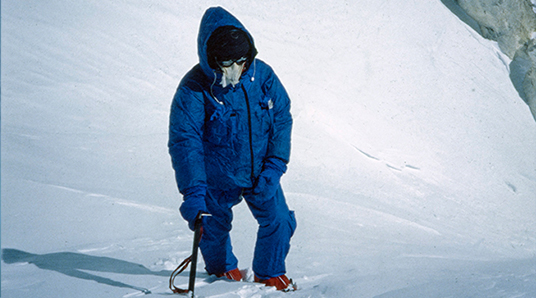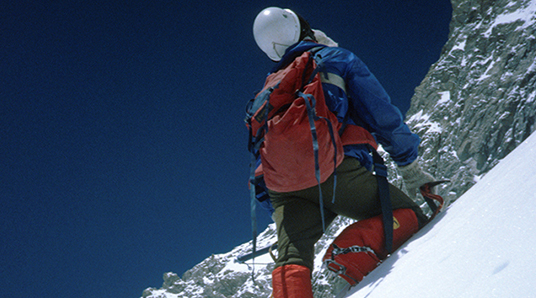Czeka nas Hidden Peak, a dokładniej jego południowo-zachodnia ściana. Nie ma już Szwajcarów. Jesteśmy sami. W dodatku zaczyna się psuć pogoda. Sypie. Sypie dzień, dwa... Codziennie rano wstajemy, wychodzimy ze swoich namiotów, patrzymy w niebo, a tu sypie. Nic nie widać. Wali śniegiem. Najtrudniejsze są godziny między posiłkami. Każdy z nas zamyka się w swoim namiocie. Wyczytujemy do ostatniego słowa wszystkie książki, każdy strzęp starej gazety. Instrukcję z płachty namiotu znamy na pamięć, Wojtek wkuwa słówka francuskie, ja angielskie. Kiedy wreszcie będzie kolacja? Mijają dwa tygodnie. Sypie... W pewnym momencie partner zaczyna przeszkadzać. Choćbym nie wiem jak dobrze z nim żył, w tej pustelni potrzebuję samotności. Więc wkładam kurtkę i idę. Byle gdzie, jakieś dwa kilometry. Przed siebie. Chcę być sam. Absolutnie sam. Bezczynność i oczekiwanie powodują, że czuję, jak siada we mnie psycha. Zaczynam dopuszczać do siebie myśl, że trzeba będzie wracać. Że nie ma szans. Przecież nie możemy nawet ruszyć palcem.
19 lipca nagle pokazuje się słońce. Stoję z Wojtkiem bez słowa i patrzymy jak urzeczeni na bogactwo skąpanych w słońcu wielki gór. Później zatrzymujemy wzrok tylko na jednym miejscu. Tym, w którym widnieje aż opuchły od śniegu kocioł u podnóża południowozachodniej ściany. I wtedy widzimy, jak spod szczytu tego kotła rusza lawina. Stoimy jak porażeni. Groza ale i wielka ulga. Wszystko to mogło spaść przecież na nas.
Bardzo trudna, na każdej wyprawie, jest ostatnia noc. Wszystko, na co można się zdobyć, to płytka, niespokojna drzemka, często przerywana koszmarnymi snami. A wyjść trzeba na długo przed świtem. Na Hidden Peak ruszamy o drugiej nad ranem. Z duszą na ramieniu przebiegamy tak szybko jak to tylko potrafimy, ten piekielnie trudny kocioł. Zaczynamy wspinaczkę od stromych pól śnieżnych, które przechodzą po kilkuset metrach w lodowe. - Cholera!- słyszę jak sapie - Nie ma gdzie wbić haka. Widzę jak próbuje raz, drugi. Z wysiłku drżą mu łydki, bo od dłuższego czasu stoi na malutkim występie skalnym, o który zaczepił zaledwie jeden ząb raka. Nie pozostaje nic innego jak cztery godziny kucia lodu, dzięki czemu możemy wejść do namiotu, którego część i tak zwisa nad kilkusetmetrową przepaścią.
Jutro postanawiamy wyruszyć w górę. Wyłania się tylko jeden problem, wcale niełatwy do rozwiązania. W tym samym dniu do bazy mają przyjść tragarze. Jak ich zawiadomić, że jesteśmy w górach, żeby na nas czekali? Wiemy, że są to ludzie niepiśmienni, w każdym razie w znaczeniu europejskim. Może któryś z nich nawet umie czytać, ale ,,robaczki” języka urdu, którego nie znamy z kolei my. Po długim namyśle decydujemy się list… narysować. Przygotowujemy dla nich jedzenie, które zostawiamy w zachęcająco otwartych bębnach. Żarcia jest w bród. Na wszelki wypadek chowamy skrzętnie trochę specjałów, które przydadzą się w drodze powrotnej. Wśród nich ostatnią już puszkę z moją ulubioną golonką. W zasadzie ryzykujemy, że wracając z góry możemy tutaj niczego już nie zastać. Możemy stracić namioty, całą zawartość, sprzęt. Dochodzimy jednak do wniosku, że w rachubę wchodzą straty jedynie materialne. Ryzykując je, nie tracimy szansy wygrania z górą. A po to tu przyjechaliśmy.
Rano kolej na mnie. Wreszcie znajduję miniszczelinę, wbijam najmniejszego haka i podbudowany tą raczej psychologiczną niż faktyczną asekuracją decyduję się na kilka ryzykownych ruchów, które doprowadzają mnie do łatwiejszego terenu. Tego dnia biwak rozkładamy na wysokości 7200.Stajemy wobec bariery skalnej, niemożliwej do pokonania na tej wysokości. Wracamy z rosnącym postanowieniem, że spróbujemy jeszcze raz. Ale którędy?
Wojtkowi spada rak. A w ścianie lodowej nie można bawić się w bociana i korzystać tylko z jednej nogi. Nie potrafię się z tym pogodzić. Po dwudziestu dniach tego upiornego czekania znaleźć się tak blisko szczytu i wycofać?
- Spróbujmy może tak… ja będę prowadził, będę wbijał w lodzie stopnie tam, gdzie trzeba, a ty może jakoś moimi śladami…?
Wojtek podchwytuje te irracjonalne pomysły i przytakuje mi. Przechodzimy jakieś sto metrów, dwieście Nagle patrzę pod nogi i nie wierzę własnym oczom. Leży Wojtkowy rak. W porównaniu z tym znalezienie igły w stogu siana jest bajecznie łatwe.


















